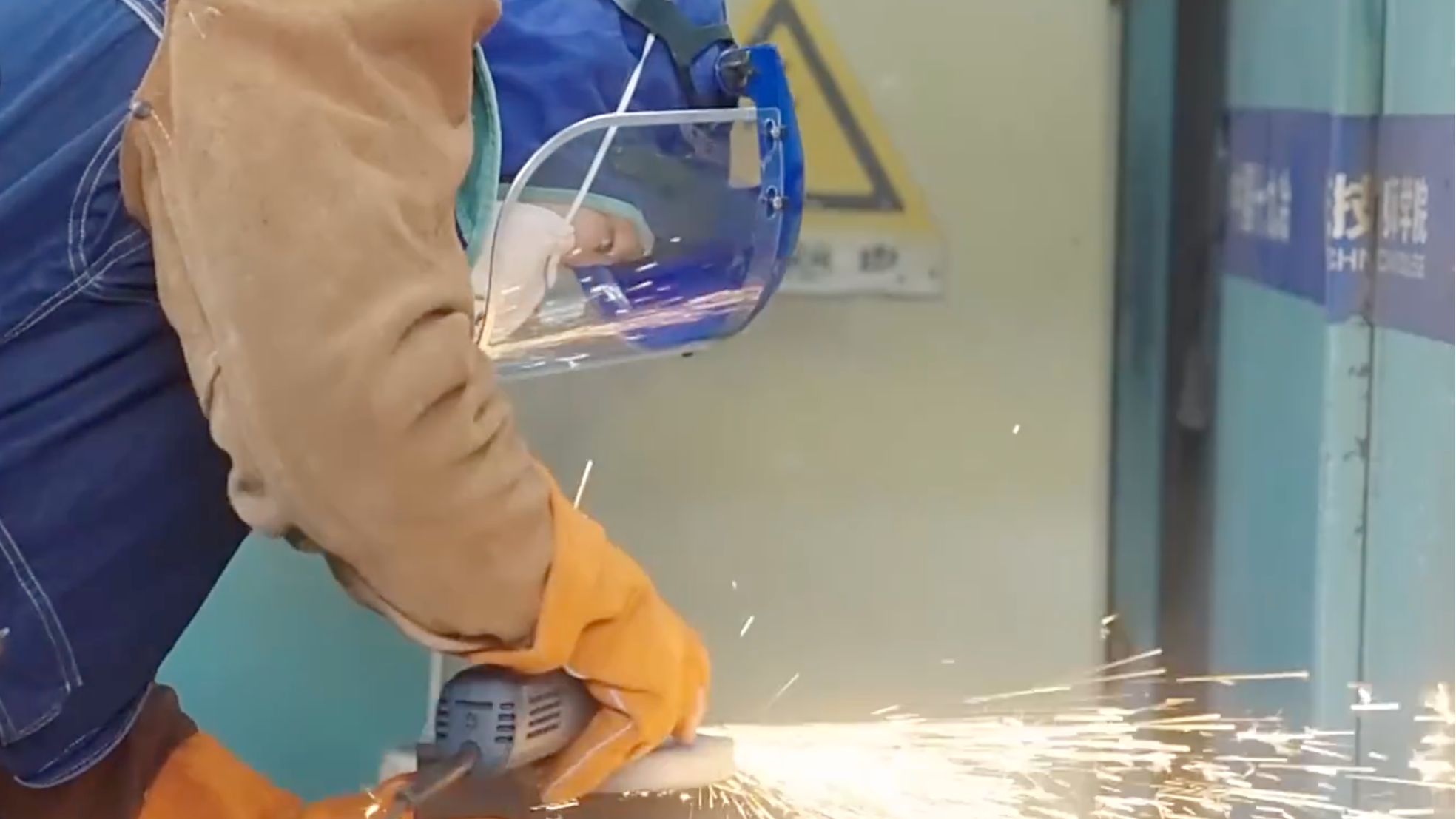
Wang Hao, a 22-year-old welding technician, began learning welding seven years ago. /CMG
Wang Hao, a 22-year-old welding technician, began learning welding seven years ago. /CMG
Wang Hao never doubted his ability to become a skilled welder.
Seven years ago, when he started to learn welding, he experienced an "arc eye," an inflammation of the cornea caused by exposure to intense ultraviolet light.
"I woke up one morning and found that my eyes could not open, they kept watering whenever I tried to close them," said Wang Hao. "I even questioned whether I could continue to practice welding."
Another challenge in welding is the requirement for strong upper body strength, especially wrist strength to maintain stability throughout the welding process. To meet this demand, Wang kept doing 100 push-ups every morning as part of his strength-training routine for six years.
As building muscle memory through extensive repetition is important for welding, he practiced at least 12 hours each day, consistently honing his skills through repeated practice. His left arm bears scars from previous welding-related burns.
Hard work paid off when he competed in China's second Vocational Skills Competition this year and became the champion in the competitive welding event.
Much like Wang Hao, many young individuals harbor aspirations of becoming skilled technicians and compete in the national competition. This year, the competition attracted over 4,000 contestants from across the country.
In addition to the traditional competitive events, 20 new skill categories related to emerging occupations and digital technology have been introduced, aligning the competition with the current trends.
For instance, autonomous mobile robotics is gaining increasing prominence in sectors such as banking, healthcare, and hospitality. The inclusion of the autonomous mobile robotics category in the competition aims to generate more public interest and attract a greater number of skilled professionals to this field.

Various tools used by contestants during China's second Vocational Skills Competition in north China's Tianjin Municipality, September 17, 2023. /CFP
Various tools used by contestants during China's second Vocational Skills Competition in north China's Tianjin Municipality, September 17, 2023. /CFP
More opportunities for young people to learn skills
Wang Hao was born in Panzhihua, a city in southwest China's Sichuan Province. In 2016, he learned that technical colleges could offer practical technology education and promising employment prospects.
Attracted by these opportunities, he chose to enroll in Panzhihua Technician College to pursue a welding program. After graduation, he successfully landed a job as a welding technician, fulfilling his career aspirations.
In recent years, many young individuals like Wang Hao have transitioned into skilled workers following technical school education.
"Students can receive waived tuition and fees, in addition to receiving a yearly living allowance of 3,000 yuan," said Zhai Jun, a teacher in charge of admissions and student career guidance at Panzhihua Technical College.
"Such support alleviates financial concerns and ensures they can pursue a high-quality education without worry."
Besides, some areas within the province have introduced preferential policies, such as free accommodation, according to the Human Resources and Social Security Department of Sichuan Province.

Students walking in Panzhihua Technical College in southwest China's Sichuan Province, China. /CMG
Students walking in Panzhihua Technical College in southwest China's Sichuan Province, China. /CMG
Since 2016, Sichuan has invested nearly 2.5 billion yuan into technical education, granting young individuals the chance to continue their vocational education, and facilitating a seamless transition from school to the job market. In recent years, the employment rate of graduates from technical colleges in Sichuan province has maintained around 98 percent.
To encourage students in technical colleges to participate in national skills competitions, cities like Chengdu have introduced substantial rewards. Gold medalists in both national and municipal competitions are eligible for a maximum reward of one hundred thousand yuan.
China has been promoting the training of technical talents on a national scale. According to a national plan for the education of skilled workers, between 2021 and 2025, technical colleges across China will provide training to a minimum of 3.6 million students, and keep up the employment rate at not less than 97 percent for graduates.
To improve the quality of technical talent training, the Ministry of Human Resources and Social Security (MOHRSS) also issued guidelines for 1,000 technical schools nationwide to implement integrated work and learning processes by 2025.
Brighter prospects for skilled workers
China has implemented laws and guidelines to elevate the status of vocational secondary schools and vocational colleges.
Starting in 2021, the MOHRSS initiated a pilot program introducing an new eight-grade vocational skills grading system for skilled workers. This system includes two additional grades beyond the previous technical career ladder, namely "master technician" and "chief technician," allowing technical employees to access higher pay and greater opportunities for career advancement.
Also, skilled workers are now encouraged to participate in professional title evaluations, a privilege that was once reserved for professionals such as engineers and accountants. Several provinces, including Heilongjiang, Jiangsu, and Henan, have introduced detailed policies to advance this reform.
"In countries like Germany, professions requiring technical skills, such as mechanical design, are considered prestigious," said Yao Jiwei, a teacher at School of Higher Vocational and Technical Education, Tianjin University of Technology and Education.
"These careers command high salaries and garner respect within society, and status of such professions in China is steadily increasing due the government's growing emphasis on vocational education," Yao told CGTN.